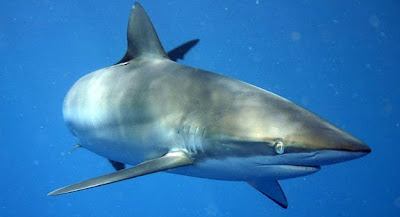 Follow up to yesterday's post, "Sharks of the Atlantic: new report cites dismal international conservation efforts" . . .
Follow up to yesterday's post, "Sharks of the Atlantic: new report cites dismal international conservation efforts" . . . The results of the ICCAT's 22nd Regular Meeting of the Commission in Instanbul, Turkey produced a mixed bag of results, leaning towards more disappointment than satisfaction. ICCAT agreed to establish greater protection for the silky shark - one of the most sought after sharks in the Atlantic shark fishing industry - but protections for the porbeagle, blue, and shortfin mako sharks were passed over, along with other important shark conservation measures that were recommended by Oceana and other conservation groups.
The results of the ICCAT's 22nd Regular Meeting of the Commission in Instanbul, Turkey produced a mixed bag of results, leaning towards more disappointment than satisfaction. ICCAT agreed to establish greater protection for the silky shark - one of the most sought after sharks in the Atlantic shark fishing industry - but protections for the porbeagle, blue, and shortfin mako sharks were passed over, along with other important shark conservation measures that were recommended by Oceana and other conservation groups.Maintaining a diplomatic stiff upper lip, an Oceana press release stated, “'It is a great day for silky sharks,' said Elizabeth Griffin Wilson, senior manager of marine wildlife at Oceana. 'ICCAT should be commended for its continued effort to protect the oceans top predators. Today’s decision to protect silky sharks is a strong step forward in protecting one of the most commonly found species in the international shark fin trade.'
Oceana did voice concern that ICCAT failed to reach consensus on several important shark measures, including those to protect vulnerable porbeagle sharks, establish science-based precautionary catch limits for blue and shortfin mako sharks and improve the current finning measure by requiring that sharks be landed with their fins wholly or partially attached in a natural manner."
Also in attendance at the ICCAT meeting were representatives of the Pew Environment Group. "Protecting one shark species a year and adopting no other measures for their conservation will not be enough to ensure the survival of these animals across the Atlantic Ocean," said Max Bello, senior advisor on global shark conservation for Pew.
Progress with international organizations can be painfully slow and patience is one of the founding principals of diplomacy. However, incremental steps at this stage may not be enough to preserve endangered shark species like the porbeagle which, it has been reported by scientists, would need a minimum of several decades and possibly more than 100 years to fully recover.
Read Oceana's press release on the results of the ICCAT meeting.
Read comments from the Pew Environment Group in the San Francisco Chronicle.

















No comments:
Post a Comment